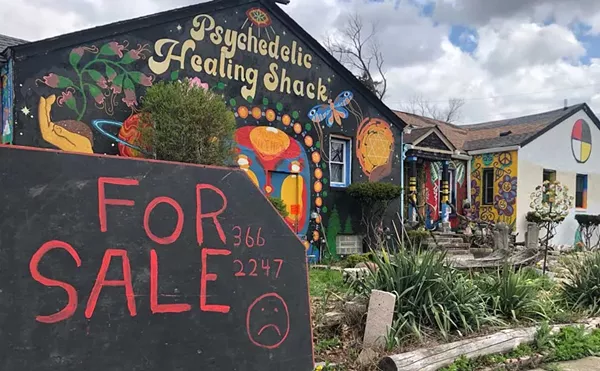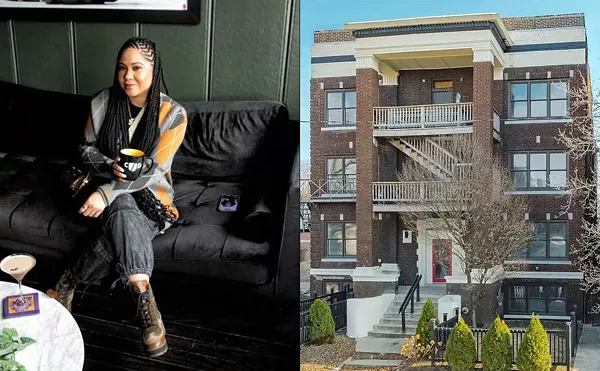
Audio By Carbonatix
[
{
"name": "GPT - Leaderboard - Inline - Content",
"component": "35519556",
"insertPoint": "5th",
"startingPoint": "3",
"requiredCountToDisplay": "3",
"maxInsertions": 100,
"adList": [
{
"adPreset": "LeaderboardInline"
}
]
}
]
news hits
Rubble-rousing
Detroit has long struggled in vain to keep up with its abandoned buildings. There are more vacant homes and businesses than the city can afford to tear down, and so the structures sit empty, adding even more blight to already blighted neighborhoods and creating new hazards.
That's not a news flash to anyone.
But here's something we haven't seen before: A building that has collapsed, its rubble spilling into the street, partially blocking it off.
OK, maybe we have seen that. But what we haven't come across previously — even to those of us who were charter members of this paper's long-disbanded Abandoned Structure Squad — is a level of municipal dysfunction so pervasive that it allows a problem like this to go unaddressed — not just for days, or weeks or even months. But for nearly two years.
But that's exactly what has happened on a section of the aptly named West End Street at West Jefferson in the city's Delray neighborhood.
We've been reading — at least we were reading until the issue moved back behind closed door — about Mayor Dave Bing's plans to "right-size" Detroit, or whatever euphemism it is they were using when the administration was in the information-gathering phase of the effort, and how that downsizing might include abandoning certain parts of the city, cutting off services to areas that have already been largely forsaken anyway.
But some of the people we've talked to in Delray feel as if the administration has already made its decision regarding Delray — a once-thriving community located in an area that has more than its share of polluting neighbors.
"This place is called Delray, but they should call it Deadray for the simple fact that the city is trying to cut it off," says resident Jonathan Hankins.
It's hard to imagine this kind of dereliction occurring in tonier neighborhoods such as Indian Village. Those areas, too, have abandoned buildings, but we haven't noticed any that have collapsed and fallen into the street.
"We're just little guys," says Doug Ferguson, another area resident. "If it happened out by the mayor's house, it would have been cleaned already."
It's not as if those who still live around here haven't tried to get the city to pay attention. Flora Moore contacted this rag after repeated attempts to get the city to clear the rubble produced no results.
"I've written letters and called. But they haven't done anything," she says.
Well, they did do something, according to Ferguson: City workers came down and looked at the problem. Apparently more than once.
"They say, We'll report it.' But they never do anything after that," Ferguson says.
We too had difficulty getting much out of the city. Dan Lijana, a spokesman for Bing who has his hands full just providing updates on who's leaving and who's coming through the revolving door that is the hallmark of Bingo's administration so far, informed us via e-mail that four buildings along that block of West End Street are scheduled for demolition. We followed up, trying to find out when that might happen, but didn't hear back from him.
We also wanted to know how this situation could have been allowed to go on for so long.
Absent any official response to that query, we'll rely on those who live in the area to speculate.
"We're so far off the radar down here, ..." says Scott Brines, who lives just a block from the rubble-strewn street. "It's a community that's been forgotten for a long time now."
Well, as it turns out, not completely forgotten. But maybe the city just needed a little reminder. On Tuesday, as this rag was about to go to press, we heard that some work was under way on over at West End Street.
So we hopped in a car and raced on over. Sure enough, a few weeks after we began repeatedly pestering the city for answers, the street had been cleared. More importantly, backhoes were chugging away removing the remains of at least three nearby buildings.
The awesome power of the Hits at work? Probably not. Nonetheless, the words from a Bob Dylan come to mind.
"Gather what you can from coincidence."
Truth out
Here's another not-so-new news flash: The metro Detroit region has a race problem.
Black, white, brown — we're all aware of that.
What you might not be aware of, though, is the nonprofit Michigan Roundtable for Diversity and Inclusion. The fact this Detroit-based group of do-gooders has been around since 1941 only goes to show how stubborn the problem is.
In a sense, there has been marginal improvement in recent decades. Based on data from the 2010 U.S. Census, our metro region is no longer the most segregated in the country.
That unenviable distinction now belongs to Milwaukee. But don't go cheering yourself hoarse. Detroit isn't far down the list, placing fourth. And, as was reported elsewhere when the data was released, if you look solely at Wayne County instead of the entire region, we're back atop the list as the most segregated place in America.
So there is much work to be done. And the Michigan Roundtable is doing its fair share of the heavy lifting.
Its most current effort to address the problem began back in late 2009 and early 2010, when the group hosted mock trials at area law schools to examine the issue of institutional housing discrimination. Focus was placed on the Federal Housing Administration and its discriminatory practices that were in place for much of the 20th century, from its endorsement of racially restrictive covenants that prevented minorities from buying homes in all-white neighborhoods to the agency's practice of "redlining," or refusing to insure mortgages in certain areas because of their racial makeup.
The purpose of these mock trials, Michigan Roundtable President Tom Costello tells News Hits, was to create a sort of road map. For us to figure a way out of the predicament that we are in, it is necessary to understand how we got here.
That was phase one of a three-tier effort the roundtable has dubbed its "Race to Equity Project."
The second phase, which is just now gearing up, involves the creation of a "Truth and Reconciliation Commission" that will further examine this region's history of housing discrimination and its ongoing effects.
Which brings us to the salient point of this particular Hit: Costello and crew are looking for volunteers to serve on the commission.
As a press release making the announcement points out: "Any resident of the Detroit metropolitan area can nominate any individual to serve as a commissioner. Nominations should be accompanied by a brief statement articulating who the nominee is and why she or he is being nominated. A selection panel will ensure that each nominee completes a full application."
If interested, you are also free to nominate yourself.
Before doing so, however, you need to ask yourself one very significant question: Are you willing to make a substantial commitment?
This isn't some fleeting project. Costello estimates that the commission will spend 18 to 24 months "delving deeply into the history of housing and race in the region and how it impacts those living here today. It will also examine what can be done to create a new regional culture in metro Detroit."
Working with members of the Housing Project Partnership — a group created by the Roundtable that includes the Fair Housing Center of Metro Detroit, MOSES, Fifth Third Bank, Transit Riders Untied, the Thomas M. Cooley Law School, University of Michigan School of Social Work, the U.S. Department of Housing and Urban Development, the Michigan Department of Education, the Michigan Suburbs Alliance and many more — a charter and mandate to guide the commission have been created. But once seated, commissioners will be in charge.
The plan is to select nine commissioners. Costello says the goal is to have the group be as diverse as possible — in terms of age, race, gender, perspective. Nominations will be accepted through Sept. 15. Members of the commission will be impaneled during a two-day conference scheduled to open Nov. 4 at Cobo Center.
Another thing to keep in mind: The goal of all this is to produce concrete results.
"We don't want a laundry list of things," Costello says. "And we don't want suggestions that are Pollyannaish."
"We are looking for nine individuals who are passionate and committed," he adds. The end result, it is hoped, will be a "plan for regional equity" that will help improve "opportunity for people who have been marginalized."
For additional information, visit the group's website at miroundtable.org. You can also contact the Roundtable's Freda G. Sampson at 313-870-1500 or by e-mail at fsampson@miroundtable.org.
Editorial intern Aaron Mondry contributed to this week's News Hits, which is written by Curt Guyette. Contact the column at 313-202-8004 or at NewsHits@metrotimes.com.





